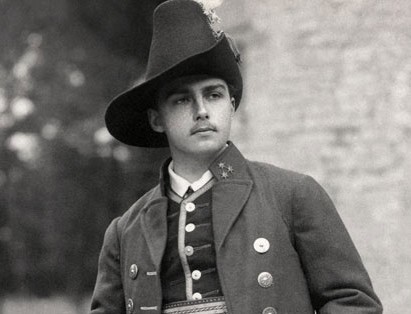(单词翻译:单击)
Obitury;Otto von Habsburg;
讣告;奥托·冯·哈布斯堡大公;
Archduke Otto von Habsburg, son of the last Austro-Hungarian emperor, died on July 4th, aged 98.
奥托·冯·哈布斯堡大公,奥匈帝国末代皇帝之子于7月4日逝世,享年98岁。

If only his great-uncle had died earlier. Franz Joseph I was a masterful ruler of the Austro-Hungarian empire, but his 86 years brought rigidity when the times called for reform. This doomed the noble legacy that his great-nephew (full name Franz Josef Otto Robert Maria Anton Karl Max Heinrich Sixtus Xavier Felix Renatus Ludwig Gaetan Pius Ignatius) could have inherited. He remembered the old man, as well as the coronation of his father Charles in December 1916. It was a short and gloomy reign, in a botched war that left Europe’s most successful multinational state, the 11-nation monarchy run from Vienna and Budapest, beyond saving. The four-year-old—first crown prince and then uncrowned pretender—served nine decades longer, with brains and charm.
要是他那个伟大的叔叔去的早点就好了。Franz Joseph I是奥匈帝国的一位优秀的统治者,只是当那个被称为改革的时代来临时,他86年岁月所带来的就只能算是顽固保守。这就注定他的侄子(全名Franz Josef Otto Robert Maria Anton Karl Max Heinrich Sixtus Xavier Felix Renatus Ludwig Gaetan Pius Ignatius)会继承这个“崇高”的使命。他记得叔叔,也记得父亲在1916年12月的加冕礼。那是一个短暂而阴暗的朝代,在那场你争我夺的战争里,欧洲最强盛的多民族政府,从Vienna到Budapest,横跨11个民族的君主制国家未能幸免于难。这位4岁被加冕,之后就无缘皇冠的皇储,以他的智慧和人格魅力生活了九十多年。
Not that people were grateful, especially at first. A gallant British officer helped the royals escape from Austria, a turbulent and shrunken republic with no taste for the finery of the past. The other realm, Hungary, was nominally a monarchy but run by a regent (who, absurdly in a land-locked country, was styled admiral). Exiled in Spain at a threadbare and tiny court, the young Otto was schooled for the empty throne: he was fluent in Croatian, English, French, German, Hungarian and Spanish. And Latin, too—he was perhaps the last politician in Europe able to conduct business in that language.
那个人其实也并不伟大,起码在最初是这样。皇室在一位勇敢的英国官员的帮助下逃离了奥地利,这个动荡的、日益缩小的共和国已没有了旧时的优雅品位。而另一个王国,匈牙利,则由摄政者(在一个内陆国家,荒谬地落实典型的海军将领作风)统治,成为了一个君主制的空壳。他们一家被一个又旧又小的西班牙法庭宣判驱逐出境。那会儿小奥托还被教育着要成为帝国继承人,他能讲一口流利的克罗地亚语、英语、法语、德语、匈牙利语和西班牙语。当然还有拉丁语——他也许是欧洲最后一个能用拉丁语办事的政治家。
In 1922 he became the head of the House of Habsburg: “Your Majesty” to legitimists, and by the Grace of God “Emperor of Austria; King of Hungary and Bohemia, Dalmatia, Croatia, Slavonia, Galicia and Lodomeria; King of Jerusalem, etc; Archduke of Austria; Grand Duke of Tuscany and Cracow; Duke of Lorraine, Salzburg, Styria, Carinthia, Carniola and Bukowina; Grand Prince of Transylvania; Margrave of Moravia; Duke of Silesia, Modena, Parma, Piacenza, Guastalla, Auschwitz and Zator, Teschen, Friaul, Dubrovnik and Zadar; Princely Count of Habsburg and Tyrol, of Kyburg, Gorizia and Gradisca; Prince of Trento and Brixen; Margrave of Upper and Lower Lusatia”. His other titles were more minor.
1922年他成为了Habsburg家族的掌门人:正统王朝派的“陛下”,受上帝保佑的“奥地利的皇帝;匈牙利,波西米亚,达尔玛提亚,克罗地亚,撕拉沃尼亚,加利西亚,罗的梅里亚,耶路撒冷的国王等;奥地利大公;托斯卡纳及克拉科大公;洛林,萨尔茨堡,萨利亚,克恩腾,卡尼奥拉及布科维纳公爵;特兰西瓦尼亚大公;摩拉维亚伯爵;西里西亚,摩德纳,帕尔马,皮亚琴察,Guastalla,奥斯维辛及Zator, Teschen,Friaul,拉古扎和萨拉的公爵;哈普斯堡及蒂罗尔,Kyburg,Gorizia及 Gradisca皇室;特兰托及Brixen王子;上、下卢萨蒂亚伯爵”。还有其他级别更低的头衔。
The Nazis sought his help, hoping for some stardust from a real ex-empire to give lustre to their gimcrack one. But the prince detested them, having slogged his way through “Mein Kampf”. As a student in Berlin, he irked Hitler by refusing to meet him. In 1938, as Austria’s leaders quailed before the Anschluss, the Habsburgs’ scion offered to return and rally resistance. Luckily, he didn’t get there. The Nazis ordered him to be shot on sight.
纳粹寻求他的帮助,希望从一个真正的旧帝国那里获得荣耀,为他们自己的小玩意增光。但是奥托憎恶他们,埋首于他自己的“我的战场”。作为一名在柏林上学的学生,因为拒绝见希特勒而惹恼了他。1938年,奥地利的领导者在纳粹德国吞并奥地利时畏缩了,哈普斯堡皇室提议奥托回去,大家集结起来一起抵抗。幸亏他没去,纳粹下令对他就地处决。
At Roosevelt’s invitation he spent the war years in America, where he plotted vainly to get Hungary to dump the Nazis, and more successfully to help Austria shed its image as Hitler’s poodle. But post-war Austria stayed nervy and vengeful, declaring him an “enemy of the republic”. He could visit only in 1966, five years after reluctantly renouncing his claim to the throne, becoming—there and there only—humble Mr Habsburg-Lothringen. He found his compatriots’ post-imperial neuroses a tempting target for his jokes. Told of an Austria-Hungary football match, he asked impishly: “Who are we playing?”
应罗斯福的邀请,战争期间奥托移居美国,在那里他徒劳的帮助匈牙利摆脱纳粹,然而有比较成功地帮奥地利褪去了“希特勒的卷毛小狗”的形象。不过战后奥地利依然焦虑并图谋报复,称他为“共和国的敌人”。直到1966年,在他不情愿地宣布放弃王位五年后,才得以重访故土,成为(也只有在那里)谦逊的哈普斯堡-洛林先生。发现他那些前帝国的子孙们貌似因为他而被人们笑话。听说在一场奥地利对匈牙利的足球赛中,他曾孩子气地问道“我们算奥地利还是匈牙利那边的?”
Exiled monarchs mostly find it hard to keep their dignity: absurdity, and a court full of creeps and fantasists, are never far away. That was not the Habsburg style: his family maintained cordial relations with Europe’s other émigré royals, but his business was more serious. First he had to restore the family fortune on the lecture circuit, which well rewarded his erudition and wit. He brought up seven children (five glamorous daughters, then two much-awaited sons) with his wife Princess Regina at a lakeside villa in Bavaria. Real politics followed: “opium”, as he fondly called it. He became a member of the European Parliament in 1979 when that body was just a talking shop, seeing it as a harbinger of bigger things to come.
大多数被流放的君主难以保守他们的尊严:总会有那么个无礼的,渺小而又天真的法庭在那里等待着他们。但这不是哈普斯堡的风格:他的家族仍和其他欧洲皇室保持着密切的联系,只是他的事业来的更为重要。首先他得从循环讲座中把家庭财富挣回来,而这多亏了他的博学和智慧。他和妻子——Regina公主住在巴伐利亚湖边的别墅,育有7个孩子(5个漂亮的女儿和2个年幼的儿子)。真正的政治生涯从“鸦片”开始,正如他所热衷称呼的那样,对政治上瘾了。1979年成为了欧洲议会的一员,那会儿这个组织还只是个耍耍嘴皮子的地方,他们将他的加入视为天降大任的一个预兆。
A family history going back to the eighth century helped him see the continent’s destiny in grand terms, with the European Union a wider and better version of the Holy Roman Empire (his family had headed that lamented outfit until history caught up with it in 1806). He was no fan of the Brussels bureaucracy, but promoted the integration his name epitomised: common culture, open borders and, above all, no more wars. Only the meanest Austrians remained uncharmed.
有个能追溯到8世纪的家族史使奥托能从宏观上看出欧洲大陆的命运:欧盟是个比神圣罗马帝国(他的家族曾统治着那个令人遗憾的帝国直至1806年被历史淘汰)更好,更宽泛的形式。他不是布鲁塞尔官僚作风的追随者,但仍提议将他的名字视为大陆融合的缩影:共同的文化,开放的边疆,还有最重要的——不再有战争。只有最不入流的奥地利人才抱着历史不放。
Putting the clock back
让我们把时钟的指针往回拨
His glory days came late, in 1989, when what had seemed a sentimental preoccupation with Mitteleuropa—merely a meteorological term, cynics sniffed—was suddenly practical politics. A lifetime foe of the communist usurpers in eastern Europe, he plotted with reformist politicians in Budapest to stage a symbolic cross-border Austro-Hungarian picnic in the summer of 1989, breaching the Iron Curtain for ever. Once drenched with blood and tears, the division of Europe was washed away with tea and lemonade. Some of his fans wished he had run as the first president of a free Hungary, providing a way back from the disastrous turning taken 70 years before. Sadly, his modesty prevailed. He concentrated instead on lobbying for speedy and generous expansion of the EU to the east, most recently Croatia.
1989年,他总算迎来了属于他的荣耀,当时原本被视为文艺的中欧(愤世嫉俗者对其嗤之以鼻,这个词几乎已成为了一个气象数语)突然就有了实际的政治意义。一生仇视东欧的共产主义篡夺者,他在布达佩斯与革命派政治家秘密谋划,于1989年夏上演了具有象征性的范欧野餐计划,彻底粉碎了铁幕。一旦浸染了血泪,欧洲分裂主义就被茶和柠檬汽水冲走了。奥托的一些崇拜者希望能由他成为匈牙利自由后的第一位总统,就好像回到了70年前,一切灾难还未开始时。只是,他的谦逊占了上峰,转而投身于游说让欧盟快速而优雅地向东延伸,最近已拓展到了克罗地亚。
He died a happy man, right about almost everything, if usually too early.
他死的明目,几乎在所有事情上都是正确的,只是还太早了点。


